CHHSM’s Impact at UCC General Synod Helps Make All Things New
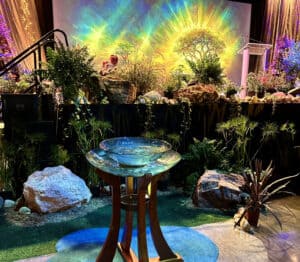
The United Church of Christ’s 34th General Synod, held June 30-July 4 in Indianapolis, brought church members together from across the country to celebrate the call of God — based on Isaiah 43 — to make all things new. And the UCC Council for Health and Human Service Ministries was integral to the entire event.
Worship bookended Synod, and featured two CHHSM preachers. Jamar Doyle, president and CEO, delivered the opening message June 30, and the Rev. Dr. J.J. Flag, CHHSM board member, preached during the closing worship service July 4.
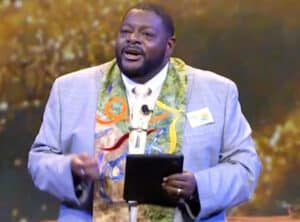
Doyle’s sermon focused on the ability of our lives and communities to be transformed by our faith. “This Synod is about transformation,” he said, “the transformation of lives through the inspiration of the Holy Spirit that in turn transforms our ministries into beacons of hope in a suffering world.”
Doyle described three steps in the process of transformation: acknowledging and being strengthened by our past; releasing the accompanying burdens of the past; and taking action with faith.
Many people and churches get stuck in step one, participating in church “the way it’s always been done.” “Our faith goes on autopilot without any depth of meaningful relationship,” Doyle said. “We become Cruise Control Christians.”
To those who use shrinking budgets and congregations to argue against trying something new, Doyle asked, “How can you afford not to? … We must let go of the familiar and get comfortable with ‘holy discomfort,’” and step out in faith.
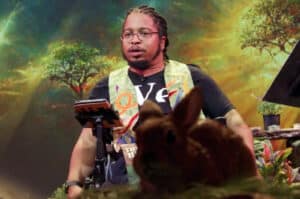
Similarly, Flag’s sermon also dealt with transformation and making all things new, but with a twist: transformation as revolution. “Do you want a revolution?” he asked. “Whether you want it or not, it is here. We have been talking about revolution all week long. When we talk about ‘God is still speaking,’ making things new, we are talking revolutionary talk.”
Flag emphasized the necessity to get back to “we.” “Church is not church without the people,” he said. “People cannot experience personhood by themselves. It takes community. So we have to repent our sin of individualism — but not just that. We have to recommit ourselves to interdependency … to doing the work together; move in covenant to one another.”
Encouraging Synod goers to take the emphasis of Synod forward as they return to their communities, he said, “My prayer is that people will say, ‘Those are the people who met in Indianapolis, Indiana, and they left to turn the world upside down.’”
Faithful Justice and Protest
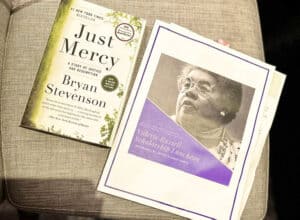
Saturday, July 1, featured several Synod-related events. Keynoting the Valerie Russell Lecture and Luncheon — held at each Synod to honor the late visionary lay leader and advocate Valerie E. Russell — was Bryan Stevenson, lawyer and activist who founded the Equal Justice Initiative, and the Legacy Museum and National Memorial for Peace and Justice in Alabama. The luncheon was sponsored by the United Church Funds and co-hosted by CHHSM and the UCC’s Justice and Local Church Ministries, a collaboration that made it possible for all attendees to receive a copy of Stevenson’s critically-acclaimed book, Just Mercy.
“We have to fight against the narratives of fear and anger,” Stevenson said. “They are the essential ingredients of injustice and oppression and abuse. And that means we have to stand strong and represent something else.”
“I believe we need an era of truth and justice in this country,” he added.
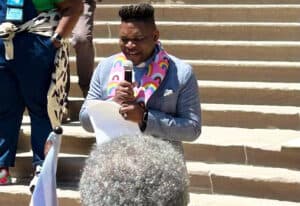
Stevenson said the Museum and Memorial were created “as truth-telling spaces. We believe our nation needs it, and we do it because there are so many things we just haven’t even started to talk about.”
Attendees found the presentation poignant. “I was deeply moved by Bryan Stevenson’s presentation about the importance of proximity to bring about justice,” said the Rev. George Graham, vice president of CHHSM.
Following the luncheon, Synod attendees participated in a walk to the nearby Indiana Capitol to protest recent state laws and court decisions and to pray — not only for people hurt by the decisions, but also for the legislators responsible for the laws.
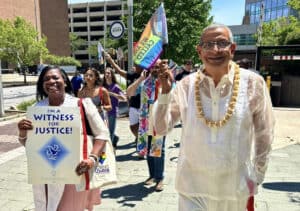
Prior to setting out on the walk, a variety of speakers prayed and lifted up important issues: new restrictions on LGBTQ+ rights, reproductive rights, inadequate mental health services, homelessness, gun violence, immigration policies, climate change, and education policies aimed at “whitewashing” history.
The Rev. Dr. Elyse Berry, CHHSM’s associate for advocacy and leadership development, participated in the walk, along with Jamar Doyle, who led a prayer on climate change. “As people of faith dedicated to environmental justice, we pledge ourselves to prayer and action for faithful climate stewardship,” Doyle prayed.
Following the speakers, the group walked to the Capitol. Once there, they held a prayer service.
CHHSM Agencies Participate
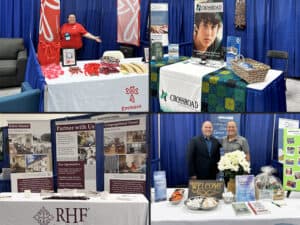
A significant portion of the Synod Exhibit Hall featured not only the CHHSM booth, but several CHHSM agencies, including Back Bay Mission, Crossroad Child & Family Services, Emmaus Homes, Hoyleton Youth and Family Services, Retirement Housing Foundation, Seven Counties Services/Bellewood & Brooklawn, United Church Homes, and Uplands Village.
“It was great to be on ‘CHHSM row,’” said the Rev. Beth Long-Higgins, vice president and director, Ruth Frost Parker Center for Abundant Aging with United Church Homes (UCH). “There was a steady stream of people stopping by. It was definitely worth the time!”
Graham concurred. “I really enjoyed meeting with a lot of delegates and visitors at the CHHSM area in the Exhibit Hall, where we could help people see the breadth and depth of CHHSM’s work as well as help people find CHHSM ministries near them,” he said.
UCH also held a workshop July 1 on the benefits of ministries with older adults. Presented by Long-Higgins and Kim Moeller, UCH’s project and special events coordinator, the workshop considered ways to reframe the demographic shift in our churches to see in older adult ministries the chance for new ministries, evangelism and faith formation.
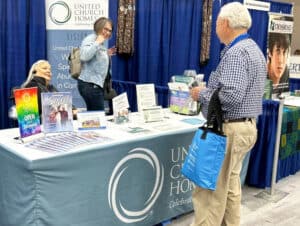
“How we think about aging affects not only how we age and how long we live but it also affects how we engage in ministry with the older members of our congregations,” said Long-Higgins.
Moeller added, “During the workshop, we talked about why it is important for faith communities to have a ministry with older adults. American gerontologist and psychologist Ken Dychtwald says, ‘Two-thirds of the people who have ever lived to age 50 and longer are alive today.’” So it is important for elders to have meaning and purpose, and relationships where they feel known she said.
“Our elders offer a rich source of wisdom that can be a valuable resource to help the church create just communities where all can age with dignity and respect,” said Moeller. “All aging is change so it is helpful that God crafted humanity to create. In responding to change, we are called to think innovatively in order to react to new situations. We asked, ‘How can the church help people acclimate to change — gradual and sudden — in others and in their own lives?’”
“Our workshop was attended by about 50 people. We felt good about the workshop, given the number of people who wanted to chat immediately afterward,” Long-Higgins added, “and several stopped by the UCH booth over the course of the next days with follow-up questions and more conversation.”
Drag Highlights July 3 Luncheon
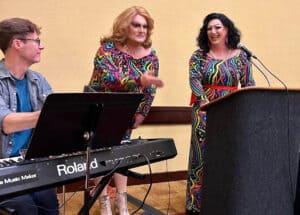
One of the more important lunch gatherings took place July 3. Sponsored by CHHSM and the UCC’s Wholeness Advocacy team, the Celebrating Disability, Mental Health, Sexuality, and Wellness Justice Luncheon was a time of inspiration, education, and celebration. It featured live musicians and drag performers, a buffet, and a panel discussion. Panelists included Berry; Bishop Allyson Abrams, Ph.D., chair of the UCC Mental Health Network; the Rev. Jess Chancey co-chair of Disability Ministries and Bekah Anderson from the UCC Disabilities Ministries Board; Rachael Ward, team leader of the UCC’s gender and sexuality justice ministries and executive director of the United Church HIV/AIDS Network (UCAN); the Rev. Rhina Ramos, national coordinator for the UCC’s Encuentros Latinx; and Alyson Breisch and Peggy Matteson of UCC Wellness Ministries.
CHHSM’s Berry found the power of the luncheon in the words of panelist Bekah Anderson. “Disability Ministries has always been about making things new. Things have not been made for us, we have had to make them new,” Anderson said.
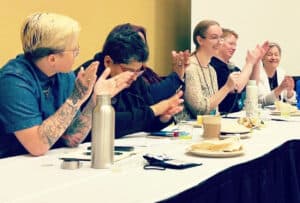
“All of those at the luncheon have a touchpoint with that statement,” said Berry. “Whether it is a drag queen singing songs of belonging, a clergywoman working for mental health justice, a queer Black woman founding a nonprofit, a non-binary leader advocating for sexuality and gender justice, a lay CEO being asked to preach in every room he enters, or a nurse claiming her authority to educate as a ministry of the Gospel — we all have had to make, and remake, things anew in our work just by being who we are.”
“This luncheon was a time to celebrate how we have made things new, and you could feel it in the room,” Berry added. “I experience this sacred time as justice flowing like energy. It was electric, contagious, you couldn’t stop it even if you tried. Being a part of that gave me actual goosebumps and pure joy.”
Following the luncheon, said Berry, “I can’t tell you how many social media posts I saw and people coming up to me to say, ‘That was the best luncheon I ever attended’ or even, ‘That was my favorite part of Synod.’”
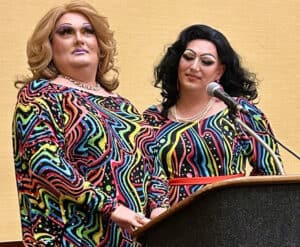
Accompanied by Sean Baker on piano, drag performers Gaye Monet and Eden Eclair chose to sing Disney songs. “Context matters, and I think all of the anti-trans legislation made the performance all the more holy and powerful,” said Berry. “At first, when they told us that they’d be performing Disney songs, we weren’t exactly sure what to think. But then hearing them sing songs of belonging, and claiming their true selves, I know those in attendance will never hear those songs in the same way again.”
Harm Reduction Resolution Passes
Amidst the worship and celebrations, much Synod business also took place. Perhaps one of the most important resolutions passed was one on harm reduction. During the morning plenary session July 3, delegates overwhelmingly passed the resolution calling on advocacy for intersectional and transformational healing in harm reduction. Harm reduction is an evidence-based approach that is critical to engaging with people who use drugs and equipping them with life-saving tools and information to create positive change in their lives and potentially save their lives.
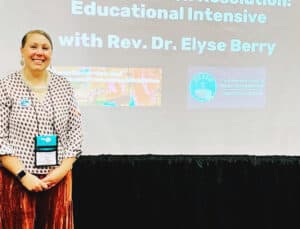
Submitted originally by the Metropolitan Association of the UCC’s New York Conference, the resolution calls on UCC congregations to adopt covenants to commit to harm reduction practices and build communities of compassionate care, hospitality, and advocacy in partnership with people with lived experience of substance use.
Berry was a resource person on the resolution, and ran the educational intensive on it, which was held June 30 prior to opening worship. “Health of the community has to be first,” she told attendees. “We have to put in the background moralism, condemnation, and perfection of how one should be, and put forth improvement, not perfection.”
Following Synod, Berry expanded her thoughts on the resolution’s educational intensive. “The intensive was a wonderful experience for me,” she said. “Some folks were there because they were interested in the topic; others were in the room because they were assigned to that particular resolution as a delegate, so there was a wide range of familiarity with harm reduction. It was powerful to see people truly take in the information, discern, listen to each other, and contemplate what this perspective means in the context of the UCC.”
In leading the educational intensive, Berry talked about harm reduction articulated as love. She shared a quote from Thomas Merton to emphasize the point: “The beginning of love is the will to let those we love be perfectly themselves, the resolution not to twist them to fit our own image. If in loving them, we do not love what they are, but only their potential likeness to ourselves, then we do not love them: we only love the reflection of ourselves we find in them.”
The quote brought “an audible gasp and exhale,” Berry said, and attendees later shared with her how the quote affected them.
Making All Things New
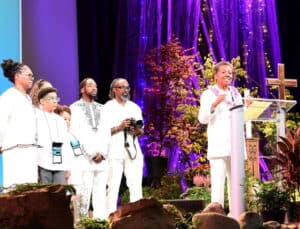
The 2023 General Synod was historic, as delegates elected the Rev. Dr. Karen Georgia A. Thompson as the first woman, and first Black woman, to lead the UCC as general minister and president.
Throughout the gathering, in activities planned and unplanned, amidst conversations and creativity, the 34th General Synod was a sacred time not only of historic significance, but of advocacy, discernment, and celebration, and CHHSM staff and members were a part of it all.
“General Synod brought home once again for me the ways in which CHHSM lives out the values, vision, and witness of the United Church of Christ every day through its member ministries,” said CHHSM’s Graham.
Doyle agreed. “General Synod is the opportunity to share with our friends and partners across the UCC,” he said. “CHHSM’s presence at Synod was one of hope as we work together to create a more just, equitable and inclusive world for all.”
Thanks to the Rev. Dr. Elyse Berry, Dr. Zaria Davis, and the CHHSM agencies for providing photos for this article.
Join Our Mailing LIst
"*" indicates required fields
Follow on Facebook
New Resident Finds Belonging at Emmaus Homes - CHHSM
www.chhsm.org
Heather’s journey toward independence has been nothing short of inspiring. Since moving into her new home last year, Heather’s world has expanded in ways she never imagined. Leaving the familiarit...